
Rice Sustainability Framework
SunRice, in conjunction with Murray Local Land Services and the Ricegrowers’ Association of Australia, has teamed up with 21 Riverina rice-growing businesses to develop a rice industry sustainability framework called the Rice Growers Promise.
The framework highlights how our rice growers operate ethical, environmentally and socially responsible businesses, while showcasing how high-quality, Australian rice is produced. Having credible data to back up our claims will improve our industry’s access to discerning, high-value domestic and international markets which are increasingly calling for responsibly and sustainably sourced products.
Using a pilot grower group, the framework has been developed by rice growers for rice growers. Our aim is to create a practical, farmer-friendly framework from the bottom up, led by growers, to capture what is important to them, to the local community and to consumers and customers.
The framework consists of key priorities which through baseline data will allow us to set tangible goals. Some of these goals will guide the development of clear and relevant research priorities to ensure the industry embraces the latest innovations and maintains its world-leading management practices.
This project is supported by Murray Local Land Services, through funding from the Australian Government’s National Landcare Program.
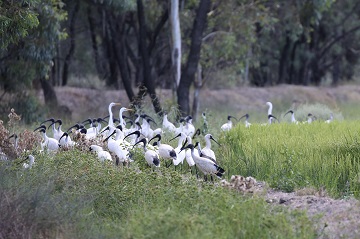
How has the framework being developed?
The framework has been collaboratively designed in a process led by growers and facilitated by SunRice, RGA and Local Land Services.
In developing the framework, the project team has held two Sustainability Academies with the pilot grower groups in the Riverina. A broader consultation of rice growers will be part of the process, as well as consultation with a broader group of stakeholders, including consumers, customers and others.
The framework will recognise and reflect that most Australian rice growers grow more than just rice and will align key priorities and goals to other commodity frameworks. We recognise that this is essential if the framework is to provide value to growers.
Riverina rice growers are among the most efficient in the world and the framework will add reliable and accurate data to verify and support this performance. The framework will include key metrics, data and systems to ensure our sustainability performance is measurable and transparent.
The aim of this framework is not to increase growers’ paperwork. Most of the data required to participate is already recorded in accordance with other legislation (e.g. chemical spray records), quality assurance systems (e.g. grain quality and harvest timing) and general business records (e.g. crop calendars, sowing dates and fertiliser applications). Rather it is the basis for growers to be able to showcase their production systems with credibility while ensuring continual improvement occurs to enhance the system.
The project team is also in discussions with other industry framework groups to help align similar credentials and, ideally, reduce grower paperwork.
In respect to the standards and metrics used, the framework will make use of and incorporate the co-convened United Nations and International Rice Research Institute’s Sustainable Rice Platform (SRP) – a collaborative platform bringing industry, general public, government and rice industry experts together to promote resource efficiency and sustainability in the global rice sector.
The SRP is the world’s first voluntary sustainability standard for rice. Using the SRP Standard, members can align on an overall framework for sustainability best practices to promote environmental, social, governance and economic criteria. It was originally developed to improve the wealth and wellbeing of small-holder rice farmers and their communities in developing countries. The Australian rice growers’ framework will look at incorporating the SRP Standards through an SRP National Interpretation Guideline (SRP NIG) for Australia, which is currently in development.
What has happened so far?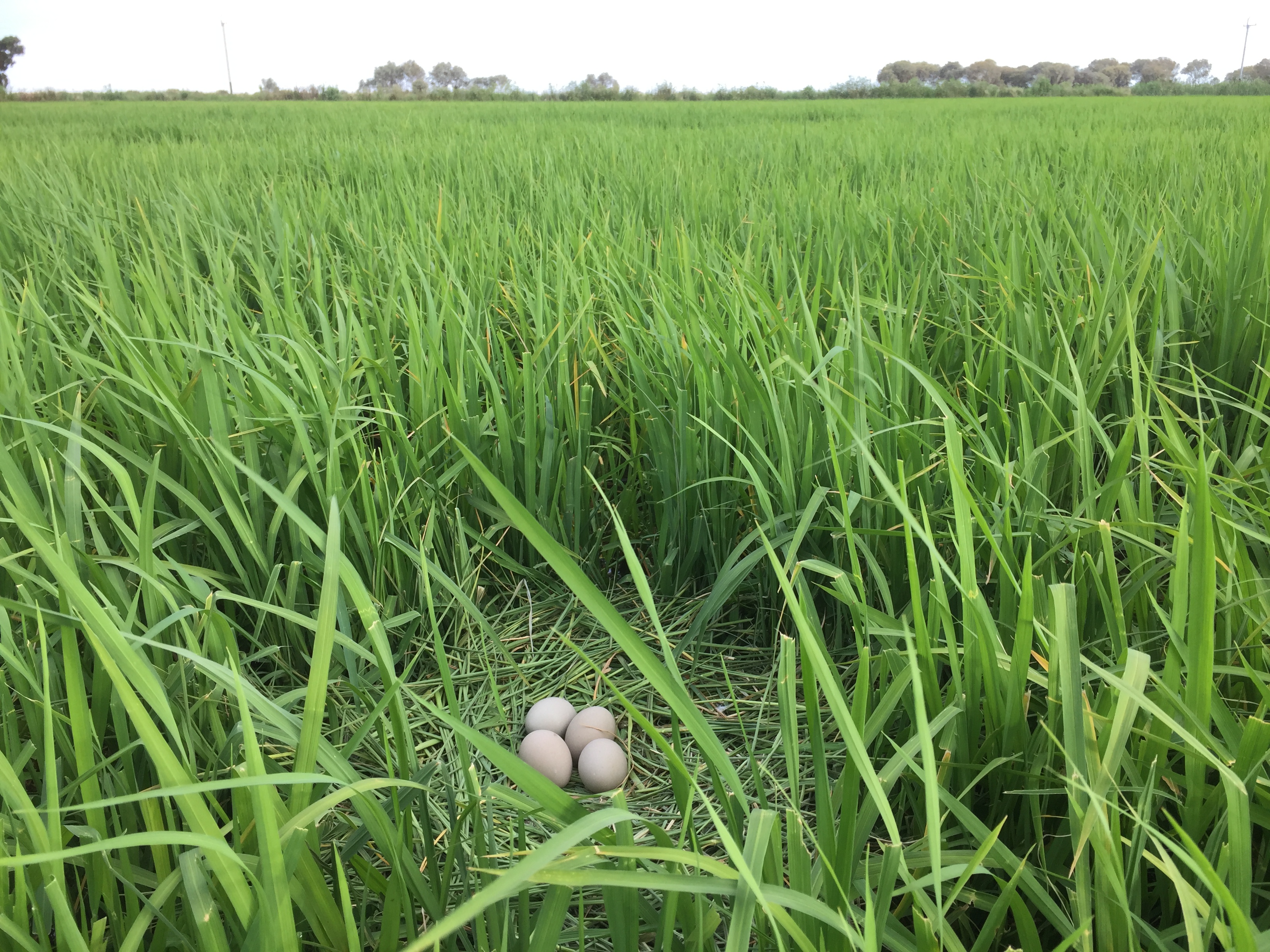
The project was established with SunRice, Murray Local Land Services, Ricegrowers’ Association of Australia and Riverina Local Land Services with funding from the Australian Government’s National Landcare Program in the 2018-19 rice season.
Since the beginning of the project, there have been three groups of pilot growers providing data and feedback on a version of an Australian NIG SRP Standard. These growers now form a single pilot grower group comprising 27 rice farming businesses helping to develop the framework and ensure it represents their interests.
Information resources have been created to help growers (within rice and other industries) understand what sustainability credentials are and prepare for accreditation in their relevant industries. To view short, animated videos on what a sustainability credential is and how they can be applied in agriculture, click here.
What does the framework cover?
The framework covers three sustainability pillars - Community, Quality, and Innovation - all of which recognise that a healthy, thriving environment is our most valuable asset and is the key to our shared success. Within each pillar, the framework outlines key priorities that the industry is aiming to improve on as shown below.
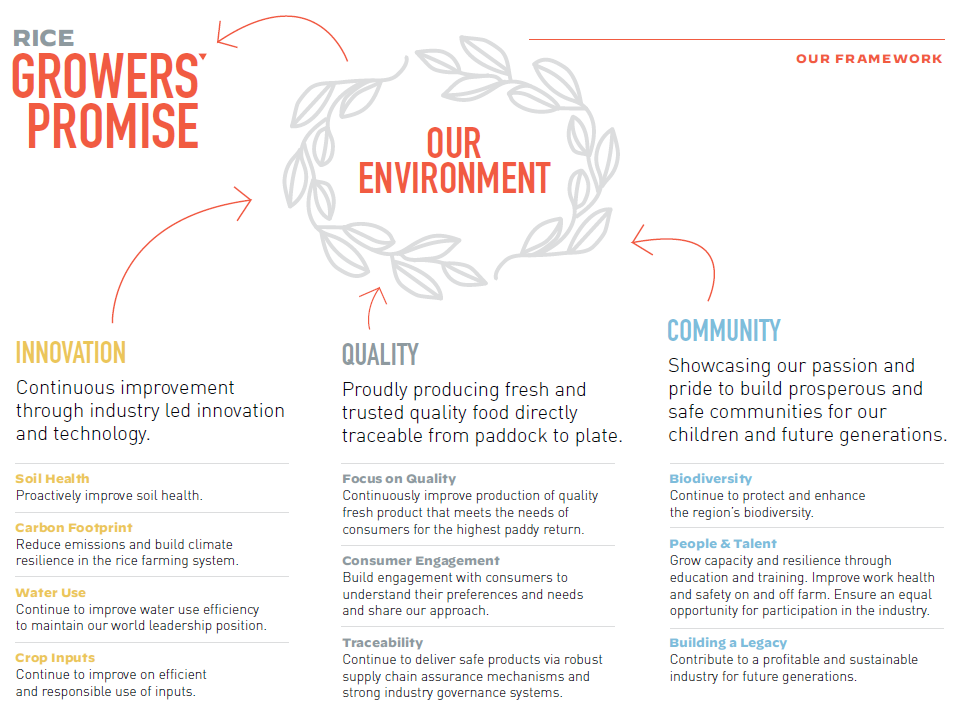
The above priorities will ultimately set and inform upon goals for future progress, providing our community and consumers with information on the industry’s sustainability achievements and performance.
Behind the framework will be an action plan developed by growers to address the priorities and meet the goals over time. The action plan will cover best-practice management for key production elements of rice growing.
This will include things like; fertiliser management, water management, chemical storage and handling, record keeping, work health and safety, stubble management, greenhouse gas emissions and on farm biodiversity.
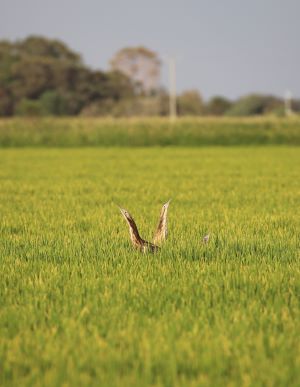
How will the framework be used?
The framework will be used to capture, communicate, and drive continuous improvement across the industry around agreed sustainability priorities and goals. Moving forward, the implementation of the framework across the wider industry will highlight the evidence to support the industry’s ‘clean, green’ reputation. It will give Riverina rice a point of difference that ensures growers can continue to access premium domestic and international markets.
The framework will eventually be used to benchmark most growers across the industry. This will include an audit of a percentage of growers each year to verify that data collected is accurate and clearly represents the level of sustainable rice farm management across the Australian industry.
It will also guide research and development by helping identify areas for improvement. This may include things such as alternative stubble uses and reducing greenhouse gas emissions.
What does it mean for growers?
This framework presents an opportunity for growers to share their sustainability successes and environmental stewardship. It will provide the entire industry with the information to affirm their clean, green image and highlight their world-class management practices.
Some of the benefits for growers will include:
- Increased productivity and environmental health through best-management practices
- Improved worker safety, business integrity and consumer confidence
- Access to premium markets and improved investor interest
- Benchmarked data that will drive continuous improvement
- Pride in the knowledge growers are doing the right thing and meeting best-management practices.
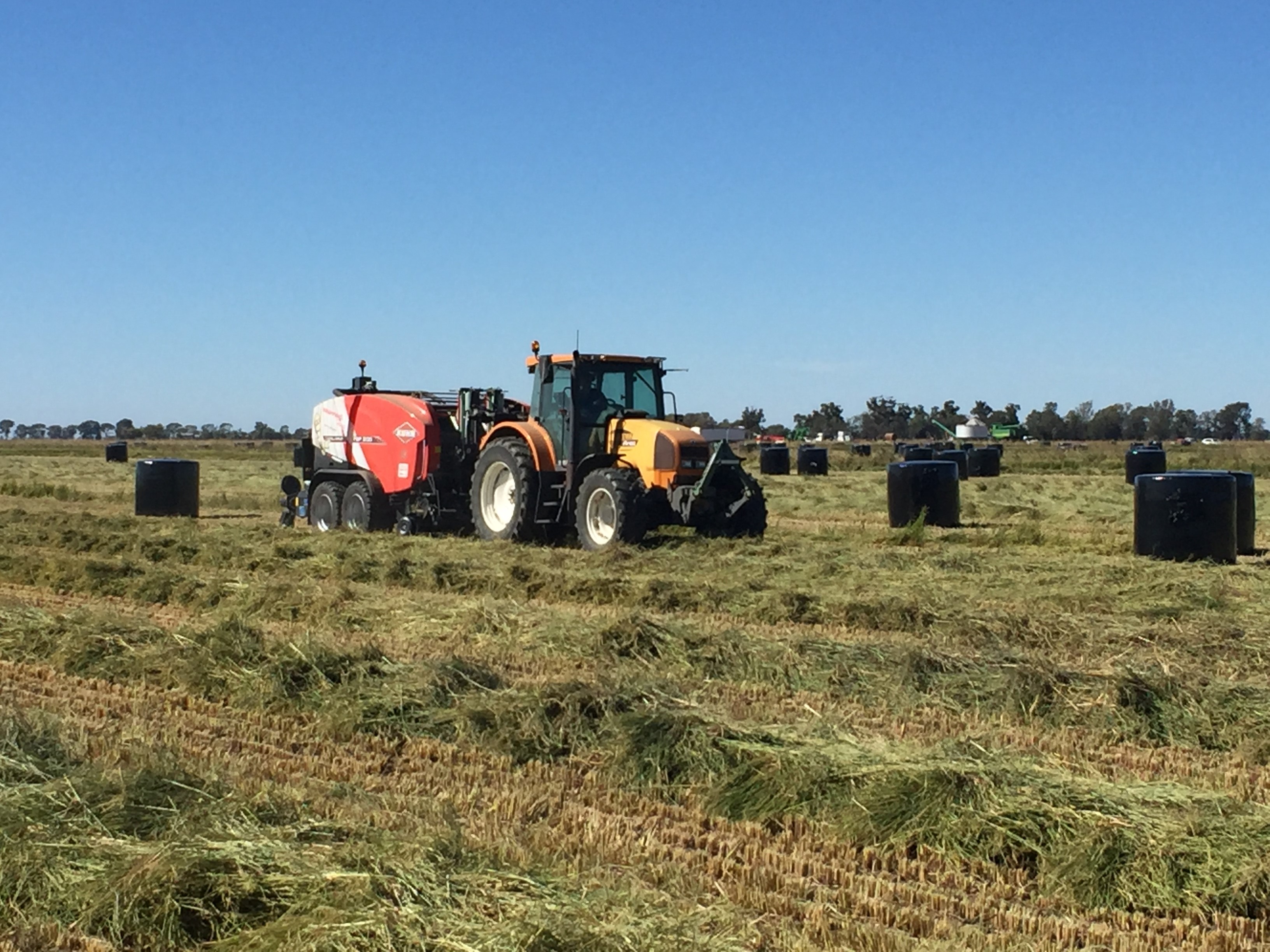
When will the framework be delivered?
Framework development is progressing well. However, as the team maintains a grower-driven approach covering the entire rice farming system, the final industry-wide roll-out date cannot be confirmed at this time.
The project team aims to have a near completed version of the Rice Growers’ Promise settled with pilot growers by the end of 2021 for distribution to a wider group of growers for feedback. Further distribution will be determined based on feedback received.
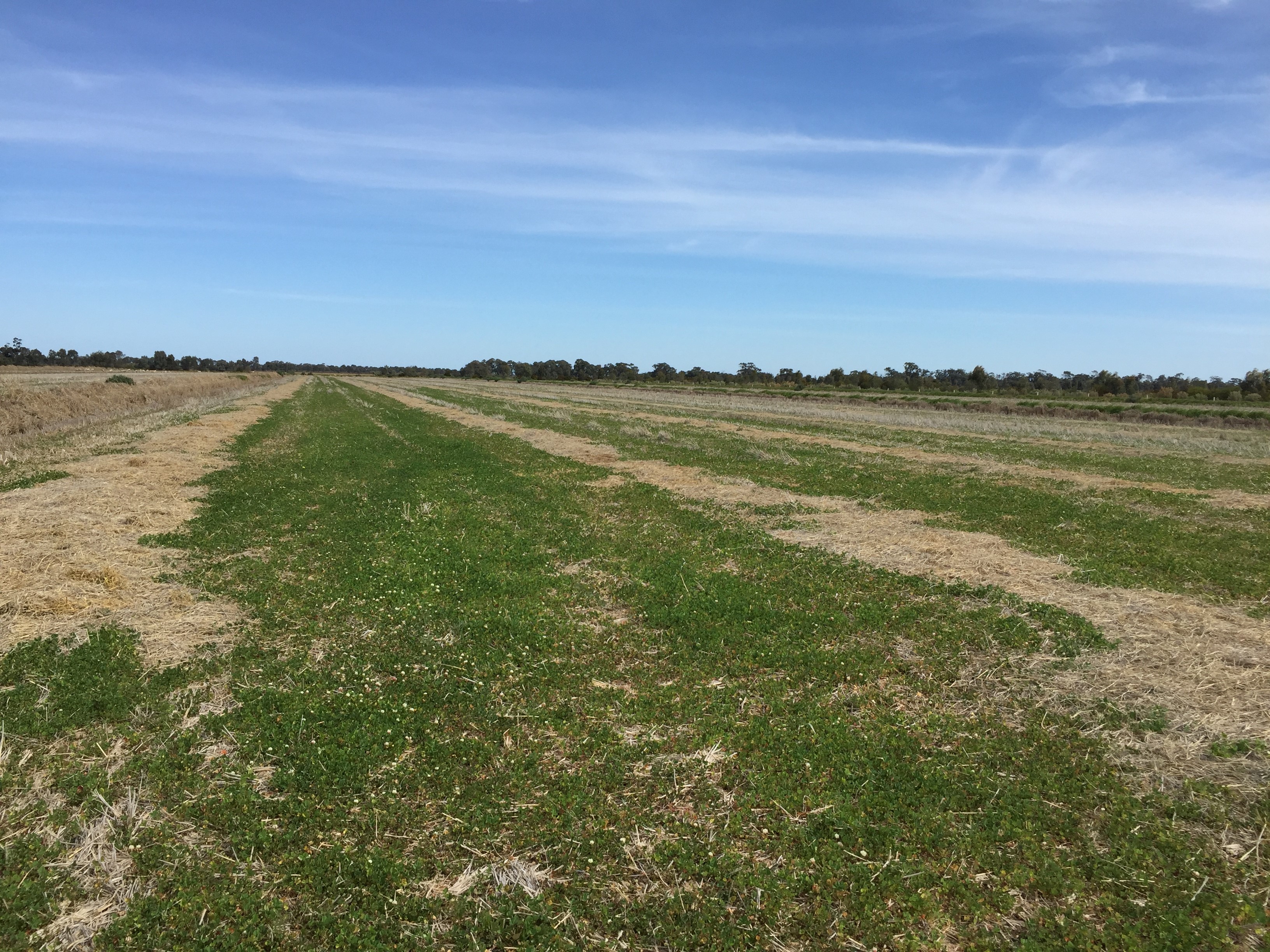
What is the timeframe for implementing the framework?
The framework pilot program is heading into its third season, with a core grower group from each of the three valleys across the Riverina. For the 2020-21 season, a wider group of growers will be offered the opportunity (not compulsory) to participate in the program through a survey. The collected data from the survey will inform and set baselines to benchmark Riverina growers’ operations and practices.
Information collected from these growers will set year one baseline data for the framework and establish clearer goals that in future, the industry will be seeking to achieve. The roll-out of the framework across the broader industry will be flexible and subject to change based on stakeholder feedback and the outcomes of the pilot program.
What’s next?
The framework’s design and in particular the logo for the Rice Growers’ Promise, developed in consultation with pilot growers, will be tested in the marketplace with consumers to ensure it resonates with a broader audience.
The key management practices and related benchmarks will be further expanded through industry research in conjunction with grower working groups.
The aim is to include as much grower feedback as possible to make certain its objectives are practical, realistic and achievable while lifting the overall industry standards.
Looking forwards to the 2021-22 season, a wider group of growers will be utilised in data collection to add to our current baselines to guarantee variations between seasons can be removed and the data set is accurate. This will also ensure that our goal setting can be firmed even further.
Who is on the steering group?
The steering committee for the project consists of representatives from all the major stakeholders. The members are as follows:
Dale Stringer, Team Leader – Agriculture Advisory, Murray Local Land Services
Chris Quirk, Head of Grower Services, SunRice
Lynette Ryan, Head of Sustainability, SunRice
Mark Groat, Grower Services, SunRice
Annabel Arnold, Grower Services & Sustainability, SunRice
Neil Bull, Environment Manager, Ricegrowers’ Association of Australia
Anna Wilson, Senior Land Services Officer – NRM, Riverina Local Land Services
Kimberley Beer, Land Services Officer – Mixed Farming, Murray Local Land Services
Gary Knagge, Riverina Rice Grower, Leeton